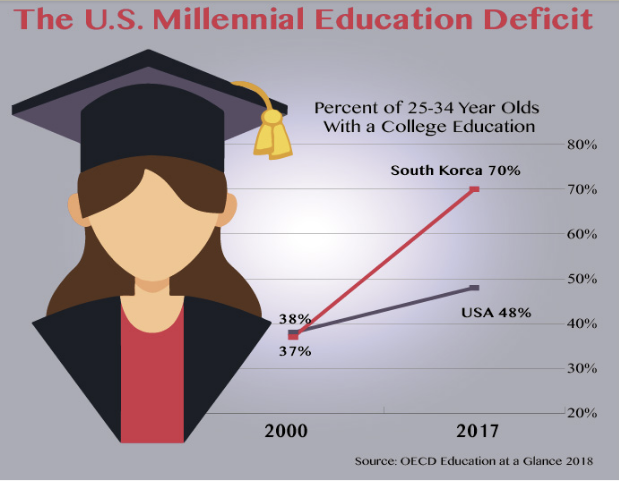In the 2015 PISA assessments, South Korea ranked seventh in reading and mathematics and eleventh in science, consistent with its performance near the top of the charts since the first PISA administration in 2000. This is a remarkable achievement for a country that essentially had to build a brand new education system at the end of the 20th century.
In the first half of the 20th century, Japan occupied Korea and only allowed the Japanese to teach in and attend the secondary schools and higher education institutions. When the Japanese left at the end of World War II, the Koreans had no teachers, no one with the level of education required to become teachers, and a population that was almost 80 percent illiterate. Efforts to build a new education system were quickly derailed by the war between North and South Korea in the early 1950s. From these inauspicious beginnings only a few decades ago, South Korea now fields one of the most highly educated and skilled workforces in the world.
Following the Korean War, the government took control of education from local school boards and concentrated it in the Ministry of Education, where it has been ever since. The Basic Education Law, passed in 1949, put in place six years of primary school, beginning at age six, followed by three years of lower secondary school and then three years of upper secondary school. Widespread illiteracy was eliminated by the mid-60s. Ninety percent of the primary school cohort was in school by the same time. The same was true for lower secondary schools by 1979. As of 2015, some 98 percent of 25-to 34-year-olds had completed upper secondary education – the highest rate in the OECD – and 69 percent of this same age group had completed post-secondary education, again the highest rate among all the OECD countries, and that rate continues to grow. Only three countries in the world have a higher proportion of adults with a post-secondary education. So, in a few short decades, South Korea has managed to go from massive illiteracy to topping the global charts in both quantity of education and quality of education.




